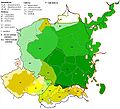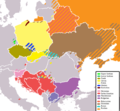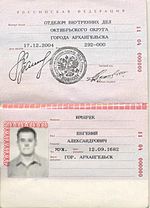The East Slavic languages constitute one of three regional subgroups of the Slavic languages, distinct from the West and South Slavic languages. East Slavic... 25 KB (1,688 words) - 02:39, 28 April 2024 |
 | The Slavic languages, also known as the Slavonic languages, are Indo-European languages spoken primarily by the Slavic peoples and their descendants. They... 72 KB (7,062 words) - 10:02, 7 April 2024 |
usually divide the Slavic languages into West Slavic, East Slavic, and South Slavic. for the West Slavic and East Slavic languages considered as a combined... 20 KB (2,223 words) - 12:14, 23 August 2023 |
The history of the Slavic languages stretches over 3000 years, from the point at which the ancestral Proto-Balto-Slavic language broke up (c. 1500 BC)... 62 KB (7,582 words) - 06:26, 27 April 2024 |
East Slavic in Wiktionary, the free dictionary. East Slavic may refer to: East Slavic languages, one of three branches of the Slavic languages East Slavs... 396 bytes (84 words) - 15:15, 15 April 2020 |
 | The South Slavic languages are one of three branches of the Slavic languages. There are approximately 30 million speakers, mainly in the Balkans. These... 42 KB (3,952 words) - 18:37, 26 April 2024 |
articles. In the Balkan Slavic languages, clitic doubling also occurs, which is characteristic feature of all the languages of the Balkan Sprachbund... 71 KB (7,773 words) - 05:40, 25 March 2024 |
East Slavic languages, modern languages of East Slavic peoples South Slavic languages, modern languages of South Slavic peoples West Slavic languages... 2 KB (296 words) - 15:54, 30 March 2024 |
questions on its relation to modern East Slavic languages, and its relation to Old East Slavic (the colloquial language used in Kievan Rus' in the 10th through... 24 KB (2,231 words) - 21:16, 14 April 2024 |
Slavs (redirect from SlavicPeoples) The Slavs or Slavic people are a group of peoples who speak Slavic languages. Slavs are geographically distributed throughout the northern parts of Eurasia;... 98 KB (8,444 words) - 12:26, 24 April 2024 |
 | Early Slavs (redirect from Slavic cradle) re-settled by Slavic populations. The East Slavic languages spread throughout eastern Europe by way of migration and language shift. East Slavic had become... 127 KB (15,621 words) - 21:06, 19 April 2024 |
four living East Slavic languages, and is also a part of the larger Balto-Slavic languages. It was the de facto and de jure official language of the former... 132 KB (11,015 words) - 10:03, 27 April 2024 |
This is similar to the use of "-son" or "-sen" in Germanic languages. In East Slavic languages (Belarusian, Russian, Rusyn, and Ukrainian) the same system... 8 KB (381 words) - 01:01, 16 March 2024 |
Ukrainian language (українська мова, ukrainska mova, IPA: [ʊkrɐˈjinʲsʲkɐ ˈmɔʋɐ]) is an East Slavic language of the Indo-European language family spoken... 117 KB (11,714 words) - 17:09, 27 April 2024 |
Slavonic and East European Languages, the title changed to Bulletin of the American Association of Teachers of Slavic and East European Languages in 1947.... 3 KB (291 words) - 16:06, 30 April 2023 |
Proto-Slavic language, the hypothetical ancestor of the modern-day Slavic languages, developed from the ancestral Proto-Balto-Slavic language (c. 1500 BC)... 75 KB (9,348 words) - 17:58, 9 April 2024 |
vocalization) occurred in parallel in the East Slavic languages. The change acted on syllables in which the Proto-Slavic liquid consonants *r and *l occurred... 13 KB (1,481 words) - 09:30, 2 February 2024 |
 | The Czech–Slovak languages (or Czecho-Slovak) are a subgroup within the West Slavic languages comprising the Czech and Slovak languages. Most varieties... 24 KB (2,061 words) - 07:47, 2 April 2024 |
of language contact between Romanian and Slavic languages is overwhelmingly towards Romanian as well as its other Eastern Romance sister languages (Aromanian... 12 KB (1,159 words) - 09:58, 9 March 2024 |









